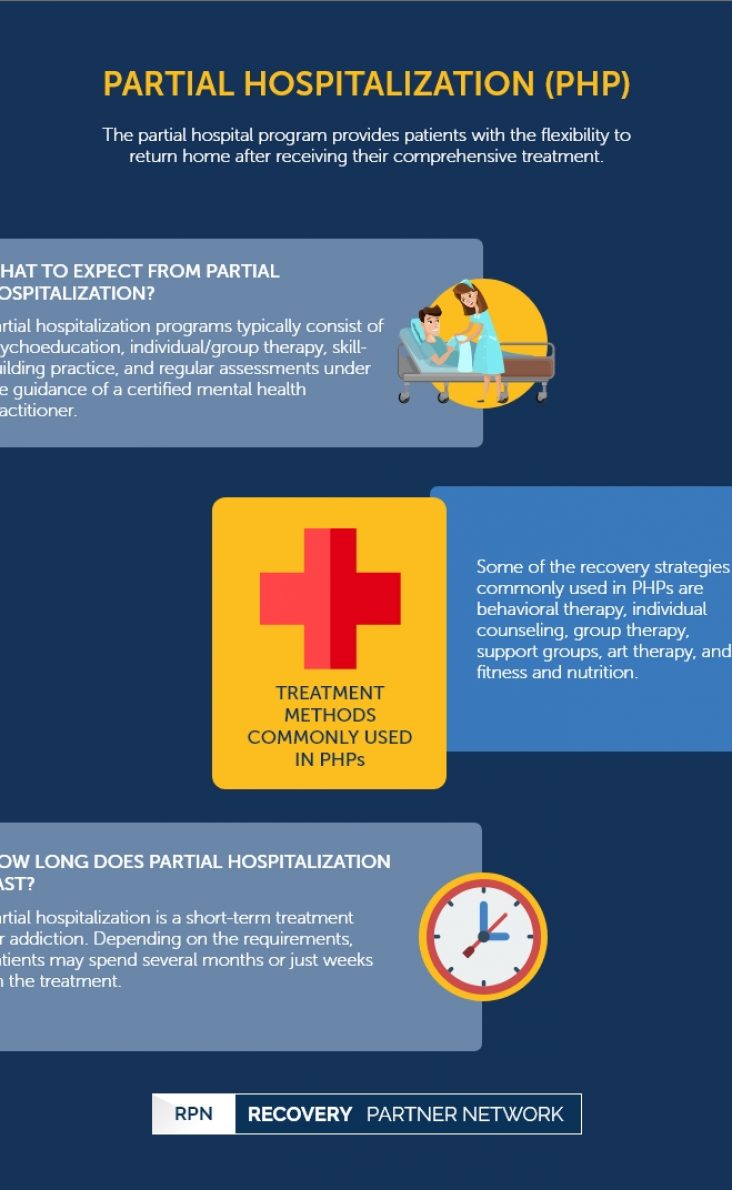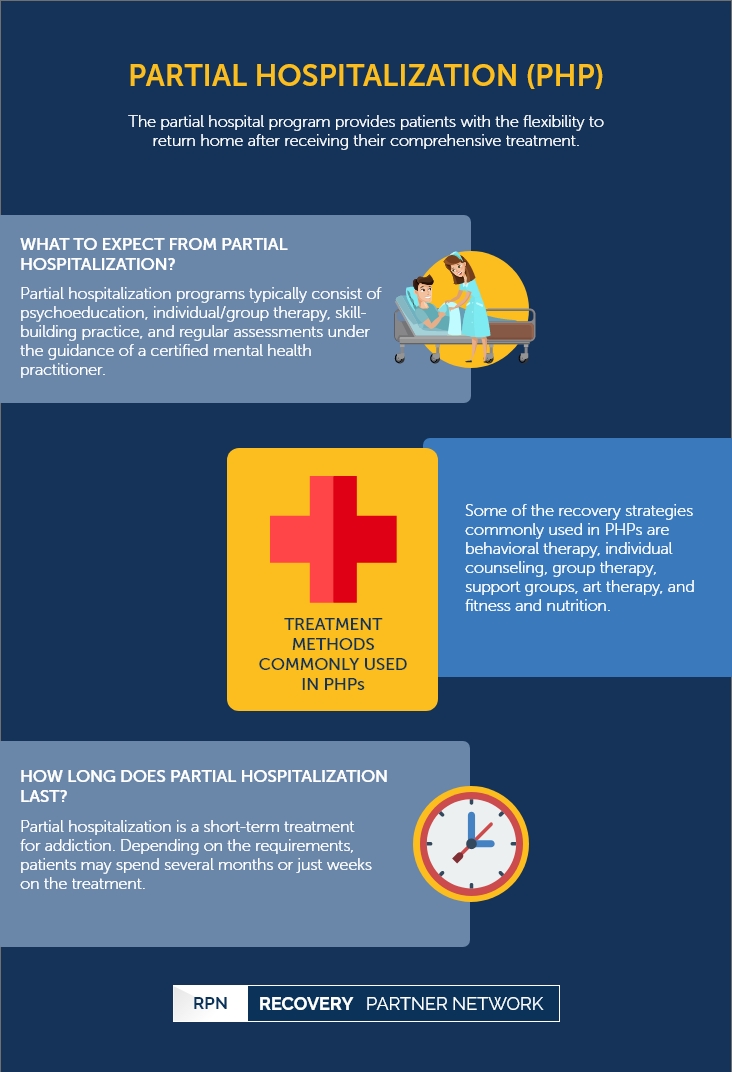The partial hospital program provides patients with the flexibility to return home after receiving their comprehensive treatment.
Partial Hospitalization (PHP)
Partial hospitalization (PHP) | Table of Contents
Partial Hospitalization
Partial hospitalization programs (PHPs), also known as day programs, provide comprehensive care for behavioral health problems without the need for an overnight stay. PHPs provide more treatment time than regular outpatient services. These programs have been proven to be effective in managing substance use disorders and several other psychiatric conditions.
Some inpatient recovery facilities provide partial hospitalization as part of their services. PHPs are also available at hospitals that provide an inpatient or outpatient addiction treatment program. Individuals in a partial hospitalization program are medically supervised during their recovery cycle as they partake in many evidence-based therapies. PHP aims to offer comprehensive care for psychiatric illnesses like alcohol addiction and drug addiction while also giving patients the flexibility of returning home at the end of each treatment.
FAQ
- Do partial hospitalization programs work?
- Do I need partial hospitalization?
- Does insurance cover partial hospitalization?
- Is PHP considered inpatient?
The partial hospitalization program is essentially one of the most successful and immersive rehabilitation programs for patients struggling with substance abuse.
It is an effective means of care for individuals who need significant mental health treatment but do not require inpatient services.
Partial hospitalization is often covered to some level by insurance companies. The insurance agencies will require the customers to initially contact them and undergo a doctor’s evaluation before getting a specific type of treatment. If something besides partial hospitalization is recommended, the insurance will only cover that specific treatment.
The objective is to imitate an inpatient treatment but in an outpatient setting.
Overview of Standard PHP
Most PHPs are crafted to provide a highly structured recovery plan for patients with acute depressive and serious mental health and substance abuse issues. It provides comprehensive day-to-day critical care for patients who have already undergone an inpatient recovery process. This program also serves as a solution for individuals who require a well-organized recovery plan to avoid decompensation and hospitalization. PHP consists of an interprofessional network of physicians, counselors, social workers, physical therapists, community employees, peer service staff, pharmacists, and psychologists. Patients undergo individualized, recovery-focused, and goal-oriented care in a less restrictive, non-institutional setting under a substance-free- environment.
FAQ
A partial hospitalization program, as assessed by a medical professional may take four to six hours per day for three to five days per week.
The level of care provided by PHP is a mixture of inpatient care and an intensive outpatient program.
According to data from the Center of Medicare & Medicaid Services, a person stays at a PHP for approximately 3-4 weeks.
What to Expect from Partial Hospitalization?
A typical day at a partial hospitalization program consists of psychoeducation, individual/group therapy, skill-building practice, and regular assessments under the guidance of a certified mental health practitioner. Patients can also receive medications and family therapy sessions through PHPs.
Scheduling and programming may vary depending on the treatment center, but most clinics employ a range of rehabilitation strategies. There are several different recovery approaches available, from conventional treatments, such as cognitive-behavioral therapy, to holistic strategies, such as trauma-sensitive yoga. PHP for kids also includes services such as schooling so that teenagers do not fall behind in their studies.
FAQ
As specified by Congress, partial hospitalization implies an outpatient program specially designed for the detection or successful care of a severe psychiatric illness where there is a fair likelihood of improvement or where the functional quality of a patient needs to be sustained, and relapse or total hospitalization is prevented.
PHP is used in the treatment of psychiatric illnesses and substance abuse disorders. They provide a highly structured day program that provides several hours of therapy and skill-building groups.
How to Know if Partial Hospitalization is Needed?
Patients must first receive an evaluation from a mental health professional or addiction specialist; the assessment will help decide which treatment is appropriate for each patient. Partial hospitalization programs (PHPs) are tailored for individuals who meet the following criteria:
- Difficulty performing at work or school
- Not at risk of hurting oneself or others
- Medically stable
- Have adequate assistance at home
- Motivated to take part in the recovery
- Having co-occurring mental health and drug use disorders
Treatment Methods Commonly Used in PHPs
Recovery strategies commonly used in partial hospitalization programs include:
- Behavioral therapy
- Individual counseling
- Group therapy
- Support groups
- Art therapy
- Fitness and nutrition
Behavioural therapy is one of the most effective aspects of treatment for addiction. Cognitive-behavioral therapy (CBT) helps patients recognize harmful cognitive habits that contribute to unhealthy behaviors, such as substance addiction or alcohol abuse. Dialectical behavior therapy (DBT) helps patients manage their emotions and develop healthy coping strategies.
Interacting directly with a therapist offers patients an opportunity to address their addiction at a deeper level. It also encourages a patient to establish targets and work towards achieving them with the guidance and support of a specialist who understands them personally.
Group therapy provides patients with a safe and secure environment for like-minded individuals to connect with one another. These groups are run by at least one therapist who helps and guides participants in understanding and building healthy relationships while working towards common therapeutic goals.
Support groups are gatherings of recovering individuals that offer support to one another in difficult times while also addressing personal problems relating to drug use and bringing to light the impact of addiction. Support groups are a vital part of recovery programs that are generally provided through aftercare programs.
Art therapy is used as a form of self-expression to help motivate recovering patients to communicate and express their feelings since most patients find it uncomfortable to share their emotions or have difficulty putting them into words.
Some PHPs provide recreational activities and health education. Feeling healthy and strong will improve a patient’s mental state and raise their desire to live a healthier life without the use of drugs.
How Long Does Partial Hospitalization Last?
Partial hospitalization is a short-term treatment for addiction. The primary goal of PHP is to help patients sufficiently heal so they could be moved to a lower level of care, such as outpatient or intensive outpatient therapy. The precise duration of stay depends on a patient’s personal improvement in terms of achieving and maintaining sobriety. Patients may spend several months or just weeks, depending on their requirements.
Recovery Partner Network
We aim to educate and empower. If you feel our library of resources does not cover your specific need, reach out to us, and we would be happy to help.
STATISTICS
© Copyright 2025


